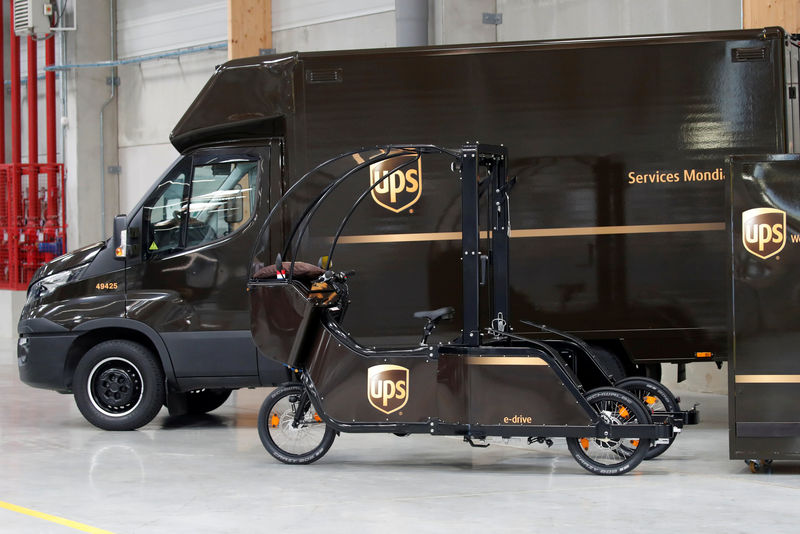This post was originally published on this site
https://i-invdn-com.investing.com/trkd-images/LYNXMPEJ6P0DB_L.jpg
LOS ANGELES (Reuters) – The head of the Teamsters union stared down UPS with a potential multibillion-dollar strike that could have damaged the U.S. economy but instead won gains for workers, and he is proud to be called “SOB.”
Sean O’Brien, elected general president of the International Brotherhood of Teamsters in 2021, appears to have lived up to his handle of @TeamsterSOB on the social media platform formerly known as Twitter with the Tuesday announcement of a tentative contract deal with United Parcel Service (NYSE:UPS).
Of course, that nickname started with his mother, who called her middle son by his initials, he said in an interview before the UPS deal was announced. Those same initials can also serve as a rather impolite term for a tough individual or son of a gun.
O’Brien had warned UPS ahead of the deal not to “go down the road of being greedy, being more loyal to Wall Street than Main Street.”
The world’s biggest package delivery firm agreed to “historic wage increases” in a “no concessions” deal demanded by the union, according to O’Brien, who said the contract would set a new standard in the labor movement and raise the bar for all workers.
“Workers across the country are sick of big corporations taking advantage of them,” said O’Brien, a fourth-generation Teamster trucker who has chalked up deals with UPS and trucking firm Yellow in just the last few days.
O’Brien crisscrossed the country in the weeks ahead of a threatened UPS strike on Aug. 1, fortifying Teamster members’ resolve with “practice” pickets and profanity-punctuated speeches.
That strike threat was too big to ignore. UPS moves about 20 million packages a day, or roughly a quarter of all such shipments in the U.S. One estimate put the cost of a 10-day strike at UPS more than $7 billion.
“Nobody wants a strike,” Massachusetts AFL-CIO President Steven Tolman, who has known O’Brien for three decades, said ahead of the settlement. “It takes a real leader to be willing to do that.”
IN THE VANGUARD
O’Brien is in the vanguard of a new generation of union leaders seeking to capitalize on the opportunity presented by a historic shift in U.S. labor markets, analysts said.
“Unions used to be on the defensive,” said John Logan, labor professor at San Francisco State University, who called the more militant, anti-corporate stance taken by the likes of O’Brien, United Auto Workers President Shawn Fain and Association of Flight Attendants-CWA President Sara Nelson “a sign of the times.”
Nelson cheered on O’Brien after the UPS deal in a statement, calling the right to strike the “only countervailing force to capitalism that is otherwise unchecked … This is how it’s done!”
UPS workers have until Aug. 22 to vote on the tentative deal. O’Brien, 51, who wears a Teamsters horses tattoo from his hometown Boston Local 25 on his right bicep, hopes to parlay that pact into success in organizing at other companies, most notably at Amazon.com (NASDAQ:AMZN) warehouses.
RALLIES AND ROLLBACKS
O’Brien swept to victory at the Teamsters in 2021 with a promise to end an era of concessionary deals that he felt eroded pay and benefits for members, especially at UPS – which employs more Teamsters than any other U.S. company.
Workers there were fuming about a 2018 contract that established a two-tier pay system for delivery drivers. Members rejected the contract, but union leadership pushed it through by invoking a constitutional provision that kicked in when less than 50% of members voted, said Steve Striffler, director of the University of Massachusetts-Boston Labor Resource Center.
That crystallized into a more hardline sentiment during the pandemic. Union officials argued that UPS workers risked their lives delivering COVID-19 vaccines before they were eligible to get the shot, only to be worked to exhaustion and in some cases for less pay than new hires.
Under O’Brien, the Teamsters eliminated the constitutional provision at the center of worker frustration. And, if approved, the latest UPS agreement will roll back two-tier pay for delivery drivers and give significant wage increases to experienced part-timers who in some cases were making the same or less than new employees.
“We’ve changed the game, battling it out day and night to make sure our members won an agreement that pays strong wages, rewards their labor, and doesn’t require a single concession,” O’Brien said.

